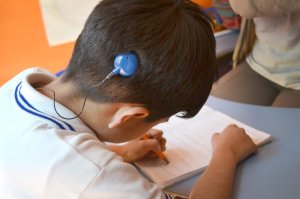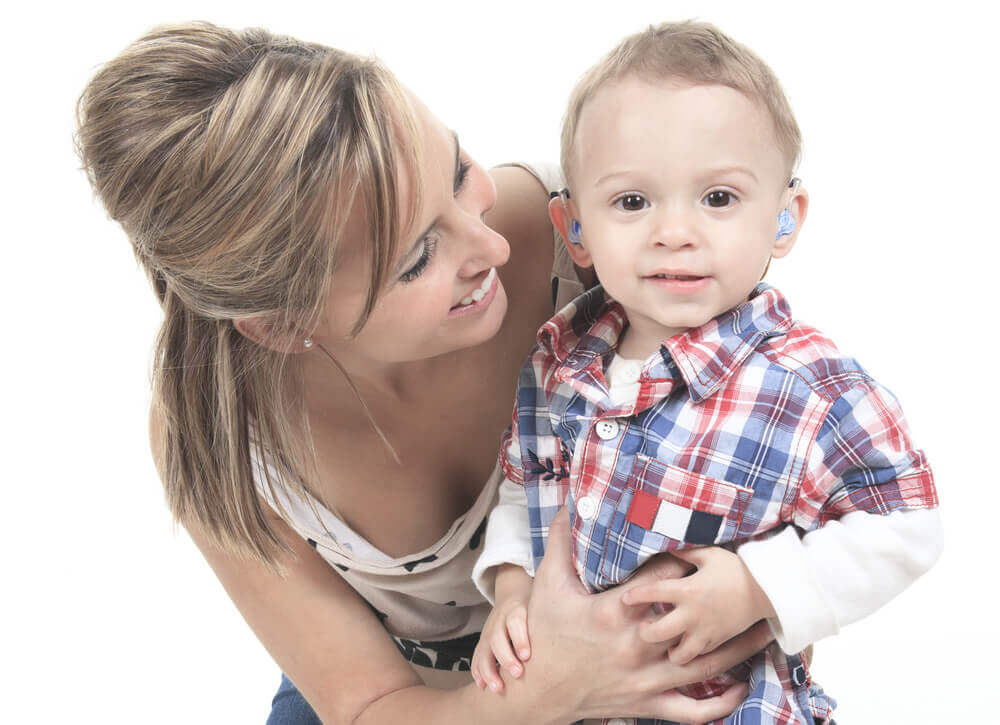Educational Needs of Deaf Children

The school system aims to include all types of students, including those that are deaf or hard of hearing. Schools need to take care of all kids and their difficulties. For this reason, we’ll explain the educational needs of deaf children.
Keep in mind that these kids have a basic sense affected. In fact, this auditory deficiency can cause lots of problems at school and in daily life.
Educational needs of deaf children
The fact that a child is deaf or hard of hearing means a series of difficulties in cognitive development. In fact, not hearing well implies:
- Having less curiosity and motivation for the events in the environment. This can result in less knowledge of the world.
- Linguistic problems that make it hard to communicate through spoken language.
- Experiencing few social interactions with other kids because of communication problems.
- Having to undergo a process of adapting to hearing aids. There are different types of hearing aids and cochlear implants, and help with listening difficulties.

Steps to address the educational needs of deaf children
At school, teachers should be in charge of promoting communication in the classroom, taking the following measures:
- Using written information to complement spoken information.
- Remember what was done in the last class to connect it to new content.
- Don’t talk for too long.
- Explain the topics with examples and practical demonstrations.
- Provide visual support materials.
- Use accessible computer media.
- Finish the classes with a summary of what you did.
- Adapt the texts, if necessary.
- Give more time for exercises and tests.
- Clarify expectations in written directions.
In addition, think about the acoustic and visibility conditions in class. For this, make sure that deaf children sit in the second row. That way, they can see the teacher and their classmates easily.
In this sense, it’s also important for teachers to never turn their back on the light or windows, and that they respect everyone when they talk. Generally, teachers need to know about each child’s educational needs. That way, deaf children can make the most of their education.
Lesson plan adaptations and learning supports
In addition to the steps we mentioned, teachers need to make adaptions to their lesson for deaf children. These should be adjusted to what students are able to do, mainly in areas that are harder for them. For example, some of these areas are:
- Spoken language. They require intervention with a speech therapist to learn and use oral language correctly. They might also need to use American Sign Language (ASL).
- Foreign languages. To learn a foreign language, they need goals based on an understanding of other oral language systems. In addition, you should focus on teaching the most common expressions.
- Music. Deaf children need to learn music through body expression, rhythm, vibrations and touch with musical instruments.

Also, deaf children or those that are hard of hearing usually have individual sessions with Speech Language Pathologists (SLP) and teachers of American Sign Language (ASL). So, they have reinforcement to help them work on certain things that are harder for them because of their condition. For example, language development, literacy, logical-mathematical thinking, etc.
Additionally, these students may need a sign language interpreter in class. That way, they can have support, depending on their level of communication development in:
- Oral language
- Sign language
Conclusion
Ideally, all teachers in public schools should be prepared to help deaf children in their classrooms. Teachers should also be trained to use:
- Alternative and augmentative systems of communication.
- Teaching methodology for students that are deaf or hard of hearing.
Unfortunately, this isn’t always a case. Therefore, there’s still a long way to go for schools to make sure kids have complete equity in their education.
The school system aims to include all types of students, including those that are deaf or hard of hearing. Schools need to take care of all kids and their difficulties. For this reason, we’ll explain the educational needs of deaf children.
Keep in mind that these kids have a basic sense affected. In fact, this auditory deficiency can cause lots of problems at school and in daily life.
Educational needs of deaf children
The fact that a child is deaf or hard of hearing means a series of difficulties in cognitive development. In fact, not hearing well implies:
- Having less curiosity and motivation for the events in the environment. This can result in less knowledge of the world.
- Linguistic problems that make it hard to communicate through spoken language.
- Experiencing few social interactions with other kids because of communication problems.
- Having to undergo a process of adapting to hearing aids. There are different types of hearing aids and cochlear implants, and help with listening difficulties.

Steps to address the educational needs of deaf children
At school, teachers should be in charge of promoting communication in the classroom, taking the following measures:
- Using written information to complement spoken information.
- Remember what was done in the last class to connect it to new content.
- Don’t talk for too long.
- Explain the topics with examples and practical demonstrations.
- Provide visual support materials.
- Use accessible computer media.
- Finish the classes with a summary of what you did.
- Adapt the texts, if necessary.
- Give more time for exercises and tests.
- Clarify expectations in written directions.
In addition, think about the acoustic and visibility conditions in class. For this, make sure that deaf children sit in the second row. That way, they can see the teacher and their classmates easily.
In this sense, it’s also important for teachers to never turn their back on the light or windows, and that they respect everyone when they talk. Generally, teachers need to know about each child’s educational needs. That way, deaf children can make the most of their education.
Lesson plan adaptations and learning supports
In addition to the steps we mentioned, teachers need to make adaptions to their lesson for deaf children. These should be adjusted to what students are able to do, mainly in areas that are harder for them. For example, some of these areas are:
- Spoken language. They require intervention with a speech therapist to learn and use oral language correctly. They might also need to use American Sign Language (ASL).
- Foreign languages. To learn a foreign language, they need goals based on an understanding of other oral language systems. In addition, you should focus on teaching the most common expressions.
- Music. Deaf children need to learn music through body expression, rhythm, vibrations and touch with musical instruments.

Also, deaf children or those that are hard of hearing usually have individual sessions with Speech Language Pathologists (SLP) and teachers of American Sign Language (ASL). So, they have reinforcement to help them work on certain things that are harder for them because of their condition. For example, language development, literacy, logical-mathematical thinking, etc.
Additionally, these students may need a sign language interpreter in class. That way, they can have support, depending on their level of communication development in:
- Oral language
- Sign language
Conclusion
Ideally, all teachers in public schools should be prepared to help deaf children in their classrooms. Teachers should also be trained to use:
- Alternative and augmentative systems of communication.
- Teaching methodology for students that are deaf or hard of hearing.
Unfortunately, this isn’t always a case. Therefore, there’s still a long way to go for schools to make sure kids have complete equity in their education.
All cited sources were thoroughly reviewed by our team to ensure their quality, reliability, currency, and validity. The bibliography of this article was considered reliable and of academic or scientific accuracy.
- Marchesi, Á. (2012). Desarrollo y educación de los niños sordos. En Á. Marchesi, J. P. González y C. Coll (Ed.), Desarrollo Psicológico Y Educación: 3. Trastornos Del Desarrollo Y Necesidades Educativas Especiales (pp.241-269). Madrid: Alianza Editorial.
- Villalba, A. y Ferrández, J. A. (1996). Atención educativa de los alumnos con necesidades educativas especiales derivadas de una deficiencia auditiva. Generalitat Valenciana.
This text is provided for informational purposes only and does not replace consultation with a professional. If in doubt, consult your specialist.








